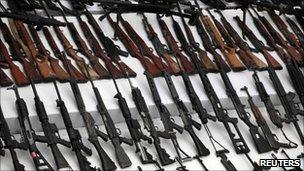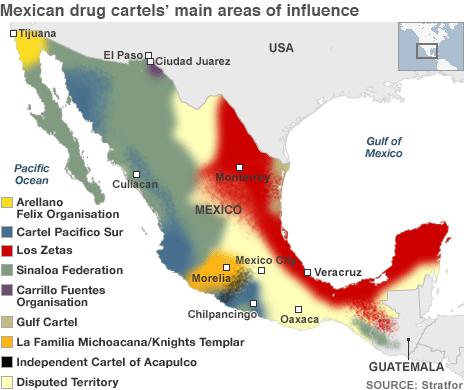US-Mexico ATF firearms smuggling sting 'mistakes'
- Published

Hundreds of guns were allegedly bought and sent to Mexican drug cartels as a part of the sting
The head of the US Bureau of Alcohol, Tobacco and Firearms has said mistakes were made in an operation to track the illegal movement of guns to Mexico.
Operation Fast and Furious saw US agents allowing hundreds of guns into Mexico illegally with the hope of tracking them to major arms dealers.
But the operation led to no arrests and many of the smuggled guns were later found at crime scenes.
The botched operation has prompted outrage in the US and Mexico.
The two senators leading a congressional inquiry, Charles Grassley and Darrell Issa, have said there may have been a "catastrophic failure" of law enforcement agencies in sharing vital information relating to arms trafficking.
FBI links
Kenneth Melson, acting head of the ATF, has come under pressure to resign over the sting carried out by an Arizona-based branch of the agency.
But in a closed meeting with members of Congress on Monday, he said he had not known about the operation until it became public and that the department of justice (DOJ) had tried to prevent him from co-operating with the inquiry.
Details of the meeting have been published in a letter sent to Attorney General, external Eric Holder by Mr Grassley and Mr Issa, which was made public on Wednesday.
In it, they said Mr Melson had been "candid in admitting mistakes that his agency made and described various ways he says that he tried to remedy the problems".
Their letter gave no details of what Mr Melson said the agency's mistakes were, but that he had been "sick to his stomach" on learning the full story of the operation.
Mr Melson said the ATF had been "kept in the dark" about links the FBI and Drug Enforcement Administration (DEA) had with Mexican drug cartel figures and that other law enforcement agencies had possessed information they did not share about their targets.
He told lawmakers he "would have preferred to be more co-operative" with the inquiry, but had been told not to by the DOJ.
Mr Grassley and Mr Issa said there were "very real indications" that the gunrunners the ATF was trying to track were already known to other US agencies and may even have been paid informants.
"If this information is accurate, then the whole misguided operation might have been cut short if not for catastrophic failures to share key information."
They said Mr Melson "appears to have been effectively muzzled while the DOJ sent over false denials and buried its head in the sand".
But Ronald Weich, a senior official at the DOJ, said he and the agency "reject entirely any suggestion that our extraordinary efforts have been designed to limit - rather than facilitate - the committee's access to information".
'Head in the sand'
The ATF reportedly allowed 1,765 guns to be smuggled into Mexico over a 15-month period, including assault weapons and high-powered sniper rifles.
The guns should have been tracked but the agency lost sight of many of them. Many were reportedly used in killings in Mexico.
In December, two US assault rifles were found at the scene of a shootout where Customs and Border Protection agent Brian Terry was killed.
US lawmakers and the Mexican government have expressed outrage at the details of Operation Fast and Furious. Mexico has repeatedly asked for US help in stemming the flow of weapons over the border.
Republicans have accused the White House of failing to turn over the relevant documents.
President Barack Obama has said it would not have been "appropriate" for the ATF to allow weapons to be smuggled into Mexico.
In January, the Mexican government released figures suggesting that at least 34,612 people had died in drug-related violence in Mexico since December 2006, although there is speculation the figure may now have passed 40,000.

- Published15 June 2011
- Published11 March 2011
- Published7 March 2011
- Published25 January 2011